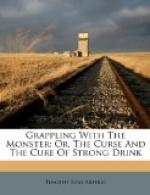Dr. Arthur Mitchell, Commissioner of Lunacy for Scotland, testified that the excessive use of alcohol caused a large amount of the lunacy, crime and pauperism of that country. In some men, he said, habitual drinking leads to other diseases than insanity, because the effect is always in the direction of the proclivity, but it is certain that there are many in whom there is a clear proclivity to insanity, who would escape that dreadful consummation but for drinking; excessive drinking in many persons determining the insanity to which they are, at any rate, predisposed. The children of drunkards, he further said, are in a larger proportion idiotic than other children, and in a larger proportion become themselves drunkards; they are also in a larger proportion liable to the ordinary forms of acquired insanity.
Dr. Winslow Forbes believed that in the habitual drunkard the whole nervous structure, and the brain especially, became poisoned by alcohol. All the mental symptoms which you see accompanying ordinary intoxication, he remarks, result from the poisonous effects of alcohol on the brain. It is the brain which is mainly effected. In temporary drunkenness, the brain becomes in an abnormal state of alimentation, and if this habit is persisted in for years, the nervous tissue itself becomes permeated with alcohol, and organic changes take place in the nervous tissues of the brain, producing that frightful and dreadful chronic insanity which we see in lunatic asylums, traceable entirely to habits of intoxication. A large percentage of frightful mental and brain disturbances can, he declared, be traced to the drunkenness of parents.
Dr. D.G. Dodge, late of the New York State Inebriate Asylum, who, with. Dr. Joseph Parrish, gave testimony before the committee of the House of Commons, said, in one of his answers: “With the excessive use of alcohol, functional disorder will invariably appear, and no organ will be more seriously affected, and possibly impaired, than the brain. This is shown in the inebriate by a weakened intellect, a general debility of the mental faculties, a partial or total loss of self-respect, and a departure of the power of self-command; all of which, acting together, place the victim at the mercy of a depraved and morbid appetite, and make him utterly powerless, by his own unaided efforts, to secure his recovery from the disease which is destroying him.” And he adds: “I am of opinion that there is a
“GREAT SIMILARITY BETWEEN INEBRIETY AND INSANITY.
“I am decidedly of opinion that the former has taken its place in the family of diseases as prominently as its twin-brother insanity; and, in my opinion, the day is not far distant when the pathology of the former will be as fully understood and as successfully treated as the latter, and even more successfully, since it is more within the reach and bounds of human control, which, wisely exercised and scientifically administered, may prevent curable inebriation from verging into possible incurable insanity.”




